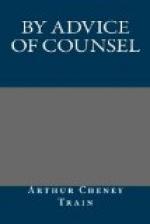“The simplest way,” announced Tutt, “is to take the position that the law should always be obeyed and that the most honorable man is he who respects it the most.”
“Yes, the safest and also the most cowardly!” retorted Miss Wiggin. “Supposing the law required you to do something which you personally regarded not only as morally wrong but detestable, would you do it?”
“It wouldn’t!” protested Tutt with a grimace. “The law is the perfection of reason.”
“But I am entitled, am I not, to suppose, for purposes of argument, that it might?” she inquired caustically. “And I say that our sense of honor is the most precious thing we’ve got. It’s our duty to respect our institutions and obey the law whether we like it or not, unless it conflicts with our conscience, in which case we ought to defy it and take the consequences!”
“Dear me!” mocked Tutt. “And be burned at the stake?”
“If necessary; yes!”
“I don’t rightly get all this!” remarked Bonnie. “Me for the lee side of the law, every time!”
“It’s highly theoretical,” commented Tutt. “As usual with our discussions.”
“Not so theoretical as you might think!” interrupted his senior, hastening to reenforce Miss Wiggin. “Nobody can deny that to be true to oneself is the highest principle of human conduct, and that ’’tis man’s perdition to be safe when for the truth he ought to die.’ That’s why we reverence the early Christian martyrs. But when it comes to choosing between what we loosely call honor and what the law requires—”
“But I thought the law embodied our ideas of honor!” replied Tutt. “Didn’t you say so—a few hours earlier in this conversation? As our highest duty is to the state, it is a mere play on words, in my humble opinion, to speak of honor as distinguished from law or the obligation of one’s oath in a court of justice. I bet I can find plenty of authorities to that effect in the library!”
“Of course you can,” countered Miss Wiggin. “You can find an authority on any side of any proposition you want to look for. That’s why one’s own sense of honor is so much more reliable than the law. What is the law, anyhow? It’s what some judge says is the law—until he’s reversed. Do you suppose I’d surrender my own private ideas of honor to a casual ruling from a judge who very likely hadn’t the remotest idea of what I think is honorable?”
“You’ll be jailed for contempt before you get through!” Tutt warned her.
“The fact of the matter is,” concluded Mr. Tutt, “that honor and law haven’t anything to do with one another. The courts have constantly pointed that out from the earliest days, though judges like, when they can, to make the two seem one and the same. Chief Baron Bowes, I remember, said in some case in 1743, ’The court can’t determine what is honor.’ No, no; the two are different, and that difference will always make trouble. Isn’t it nearly tea time?”




